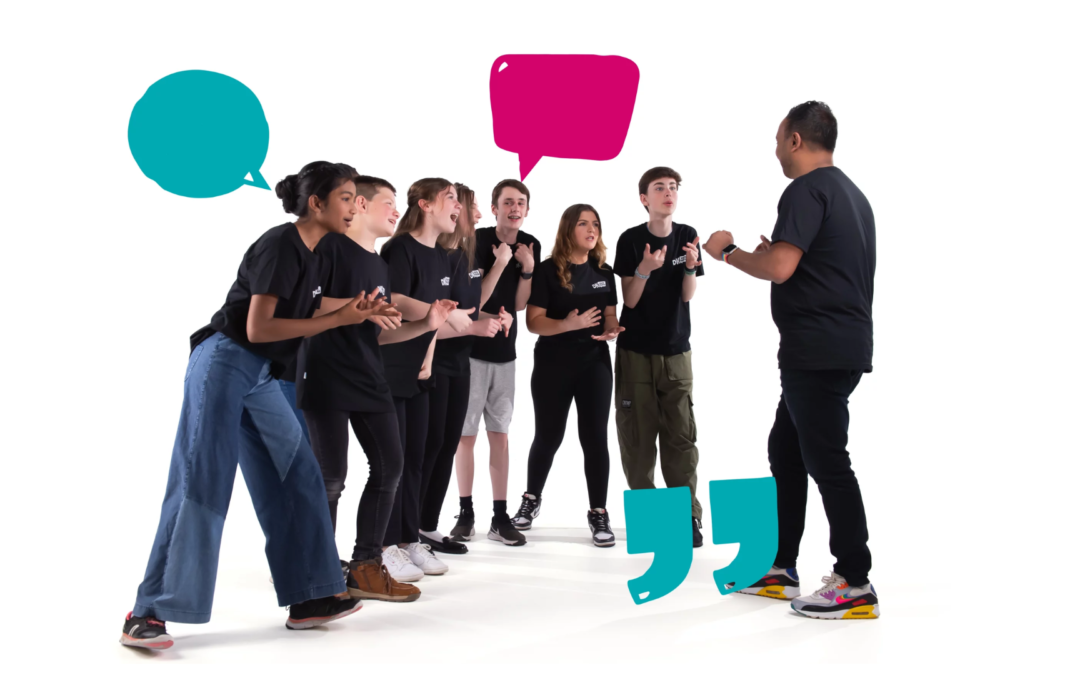How Drama Can Improve Your Public Speaking Skills
Public speaking is one of the most important skills to have at your disposal. Why? Because at some point in your life, you will be required to speak in public, whether it’s a business presentation, a monologue in a school play or a wedding speech.
However, it’s not merely about conveying information; it’s about connecting, inspiring, and leaving a lasting impact.
Yes, the journey from a nervous speaker to a confident orator can be a bit daunting. In fact, around 25% of individuals experience moderate levels of fear when speaking in public.
The world of dramatic arts, with its expressive range, character development, and stage presence, offers a unique avenue to learn crucial skills that make a great public speaker.
We’re going to look at how dramatic techniques can equip anyone with the tools to captivate an audience. Whether you’re addressing a boardroom, a classroom, or even just a group of friends, drama lessons can not only boost your confidence but teach you how to communicate with your audience effectively.
How Drama and Public Speaking Go Hand-in-Hand
Drama is about bringing characters and narratives to life in a way that resonates with audiences. Now, apply this principle to public speaking, and you begin to see the connection.
Drama is all about expression; actors learn to embody their characters, convey emotions, and engage with the audience. These same skills are the building blocks of effective public speaking.
Drama also helps develop a stage presence that instils confidence, poise, and the capacity to handle performance anxiety – crucial attributes for any speaker.
Building Confidence Through Drama Exercises
We can all agree that confidence is the cornerstone of effective public speaking, right?
Drama, with its emphasis on self-expression and performance, provides an ideal training ground for building confidence.
A study conducted by The Australian Theatre for Young People discovered that of the 1,200 people surveyed, 89% reported participating in the drama programme had a positive impact on their self-confidence. 94% of respondents also claimed it had a positive impact on their overall sense of well-being.
Dramatic exercises often include activities like improvisation, where you must think on your feet and trust your instincts. Through character development, you explore different personas, learning to embrace new roles and perspectives. These are transferable skills that can help boost your self-esteem when speaking in different situations.
Our adult drama classes are perfectly catered to help boost confidence and improve your public speaking skills. Why not check them out?
Drama Connects, it Doesn’t Simply Convey!
Ever been to a wedding where someone absolutely nails their speech?
It’s likely because they didn’t just convey information, they immersed you in their narrative. This ability to engage is a hallmark of effective public speaking, and drama provides valuable techniques to achieve it.
You could have the most engaging narrative lying in front of you, but if you’re not able to immerse your audience in your storytelling, you might as well be reading them your shopping list. Your aim is to transport your audience into the world of your message, to make them forget the beige boardroom they’re likely sitting in.
Storytelling plays a crucial role in achieving this through character development and script analysis, actors learn to connect with narratives on a deep level. They understand the motivations, emotions, and conflicts of characters. This skill translates directly into crafting engaging speeches and presentations, where you become the storyteller.
It’s not just about relaying facts; it’s about making your audience feel something. Whether it’s through the intensity of a dramatic scene or the humour of a well-timed comedic moment, drama provides a rich toolbox for evoking emotion.
‘It’s Not What You Said, It’s How You Said it’
The phrase ‘it’s not what you said, but how you said it’ actually holds some weight in the context of public speaking. One study indicates that effective presentations are 38% your voice, 55% non-verbal communication, and only 7% your content.
Take actors, for example. Actors learn to project their voices, articulate clearly, and convey emotions authentically. Whether it’s through vocal exercises that improve clarity or body language techniques that enhance expression, drama equips you with the tools to communicate with impact.
Storytelling also plays a crucial part in this, as it’s at the heart of drama and compelling public speaking. In drama, you become part of a narrative, connecting with characters and their experiences and this skill translates seamlessly to public speaking.
Researchers Dan & Chip Heath conducted a study on how storytelling influences memory recall and engagement. The findings of their study revealed that after a presentation, only 5% of people were able to recall specific statistics from the event, while 63% of attendees could remember the story told by the presenter.
So, by embracing the expressive elements of drama, you not only refine your communication but also connect with your audience on a deeper level.
Conquering Stage Fright and Anxiety With Drama
Stage fright or speech anxiety remains one of the most common everyday worries in the UK – affecting around 77% of people in the UK.
The pounding heart, the trembling hands, the racing thoughts, it’s arguably one of the most nerve-wracking feelings to experience. However, drama equips you with the means to confront and conquer these anxieties.
Actors face live audiences almost daily, and the pressure to perform flawlessly is immense. This experience provides a training ground for managing stage fright. Through rehearsal and repetition, actors build the resilience to cope with nerves. This same approach can be applied to public speaking.
Drama also teaches the importance of presence – the ability to be fully in the moment. When you’re engaged with your character and the narrative, it leaves little room for anxiety to creep in. Similarly, when you’re deeply immersed in your message while speaking, you’re less likely to be consumed by stage fright.
Plus, stage fright is often only present before you hop on the podium or just moments after. As soon as you get into the flow of what you’re presenting, the easier it becomes.
And let’s not forget the support network within the world of drama. Actors rely on their fellow cast members and directors for encouragement and feedback. In public speaking, seeking support and feedback from mentors, peers, or speaking clubs can provide a similar sense of security.
Become a Confident Public Speaker Today
No one is pretending that public speaking isn’t a little nerve-wracking! However, drama classes provide a fantastic foundation for building confidence and learning the key aspects of successful public speaking.
If you would like to improve your public speaking skills, take a look at our adult drama classes and youth theatre classes.
Alternatively, if you’d like to learn more about what’s covered in the classes, you can call us!
Written by Connor Hughes

